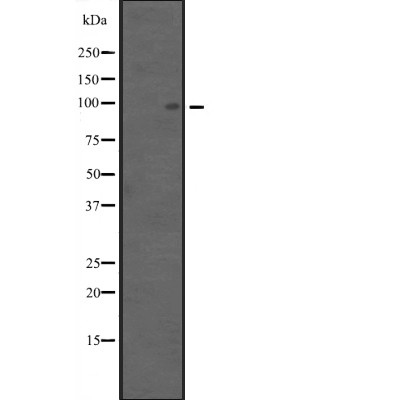ANAPC4 Antibody - #DF2570
| Product: | ANAPC4 Antibody |
| Catalog: | DF2570 |
| Description: | Rabbit polyclonal antibody to ANAPC4 |
| Application: | WB |
| Reactivity: | Human, Mouse, Rat |
| Prediction: | Pig, Bovine, Horse, Sheep, Rabbit, Dog |
| Mol.Wt.: | 92 kDa; 92kD(Calculated). |
| Uniprot: | Q9UJX5 |
| RRID: | AB_2839776 |
Related Downloads
Protocols
Product Info
*The optimal dilutions should be determined by the end user. For optimal experimental results, antibody reuse is not recommended.
*Tips:
WB: For western blot detection of denatured protein samples. IHC: For immunohistochemical detection of paraffin sections (IHC-p) or frozen sections (IHC-f) of tissue samples. IF/ICC: For immunofluorescence detection of cell samples. ELISA(peptide): For ELISA detection of antigenic peptide.
Cite Format: Affinity Biosciences Cat# DF2570, RRID:AB_2839776.
Fold/Unfold
ANAPC 4; anapc4; Anaphase Promoting Complex Subunit 4; Anaphase-promoting complex subunit 4; APC 4; APC Complex Protein CUT20; APC4; APC4_HUMAN; CUT20; Cyclosome subunit 4; LID1;
Immunogens
A synthesized peptide derived from human ANAPC4, corresponding to a region within the internal amino acids.
- Q9UJX5 APC4_HUMAN:
- Protein BLAST With
- NCBI/
- ExPASy/
- Uniprot
MLRFPTCFPSFRVVGEKQLPQEIIFLVWSPKRDLIALANTAGEVLLHRLASFHRVWSFPPNENTGKEVTCLAWRPDGKLLAFALADTKKIVLCDVEKPESLHSFSVEAPVSCMHWMEVTVESSVLTSFYNAEDESNLLLPKLPTLPKNYSNTSKIFSEENSDEIIKLLGDVRLNILVLGGSSGFIELYAYGMFKIARVTGIAGTCLALCLSSDLKSLSVVTEVSTNGASEVSYFQLETNLLYSFLPEVTRMARKFTHISALLQYINLSLTCMCEAWEEILMQMDSRLTKFVQEKNTTTSVQDEFMHLLLWGKASAELQTLLMNQLTVKGLKKLGQSIESSYSSIQKLVISHLQSGSESLLYHLSELKGMASWKQKYEPLGLDAAGIEEAITAVGSFILKANELLQVIDSSMKNFKAFFRWLYVAMLRMTEDHVLPELNKMTQKDITFVAEFLTEHFNEAPDLYNRKGKYFNVERVGQYLKDEDDDLVSPPNTEGNQWYDFLQNSSHLKESPLLFPYYPRKSLHFVKRRMENIIDQCLQKPADVIGKSMNQAICIPLYRDTRSEDSTRRLFKFPFLWNNKTSNLHYLLFTILEDSLYKMCILRRHTDISQSVSNGLIAIKFGSFTYATTEKVRRSIYSCLDAQFYDDETVTVVLKDTVGREGRDRLLVQLPLSLVYNSEDSAEYQFTGTYSTRLDEQCSAIPTRTMHFEKHWRLLESMKAQYVAGNGFRKVSCVLSSNLRHVRVFEMDIDDEWELDESSDEEEEASNKPVKIKEEVLSESEAENQQAGAAALAPEIVIKVEKLDPELDS
Predictions
Score>80(red) has high confidence and is suggested to be used for WB detection. *The prediction model is mainly based on the alignment of immunogen sequences, the results are for reference only, not as the basis of quality assurance.
High(score>80) Medium(80>score>50) Low(score<50) No confidence
Research Backgrounds
Component of the anaphase promoting complex/cyclosome (APC/C), a cell cycle-regulated E3 ubiquitin ligase that controls progression through mitosis and the G1 phase of the cell cycle. The APC/C complex acts by mediating ubiquitination and subsequent degradation of target proteins: it mainly mediates the formation of 'Lys-11'-linked polyubiquitin chains and, to a lower extent, the formation of 'Lys-48'- and 'Lys-63'-linked polyubiquitin chains.
Belongs to the APC4 family.
Research Fields
· Cellular Processes > Cell growth and death > Cell cycle. (View pathway)
· Cellular Processes > Cell growth and death > Oocyte meiosis. (View pathway)
· Genetic Information Processing > Folding, sorting and degradation > Ubiquitin mediated proteolysis. (View pathway)
· Human Diseases > Infectious diseases: Viral > HTLV-I infection.
· Organismal Systems > Endocrine system > Progesterone-mediated oocyte maturation.
Restrictive clause
Affinity Biosciences tests all products strictly. Citations are provided as a resource for additional applications that have not been validated by Affinity Biosciences. Please choose the appropriate format for each application and consult Materials and Methods sections for additional details about the use of any product in these publications.
For Research Use Only.
Not for use in diagnostic or therapeutic procedures. Not for resale. Not for distribution without written consent. Affinity Biosciences will not be held responsible for patent infringement or other violations that may occur with the use of our products. Affinity Biosciences, Affinity Biosciences Logo and all other trademarks are the property of Affinity Biosciences LTD.
